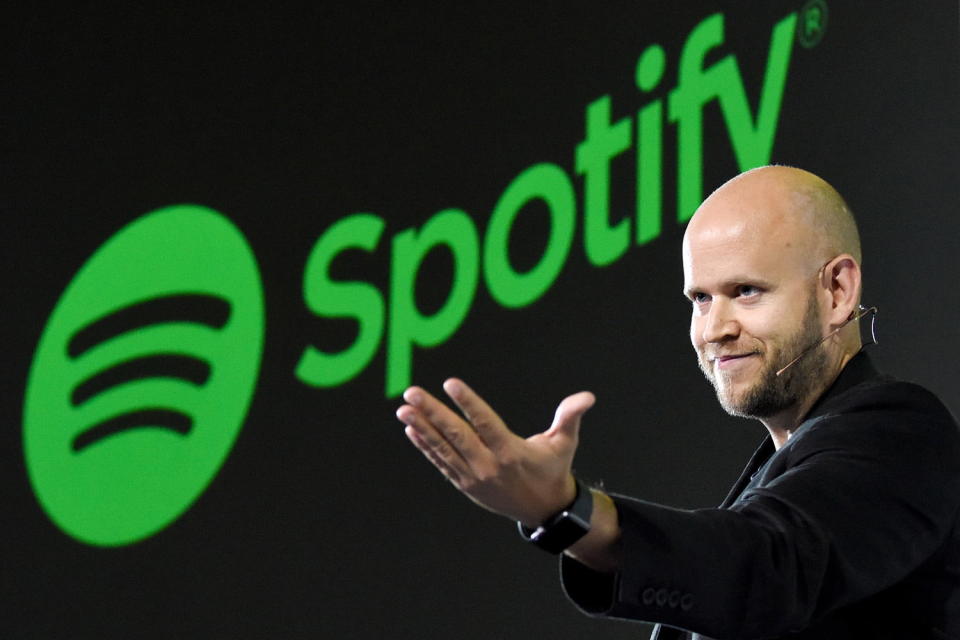Spotify IPO — What you need to know in markets on Tuesday
After a rough first quarter, the second quarter did not greet investors with better news.
Stocks got slammed on Tuesday with tech stocks again lagging the market as Amazon (AMZN) dropped 5% and was again in the headlines following a tweet from President Donald Trump.
Other major losers on Monday included Intel (INTC), which dropped as much as 9% after a Bloomberg report said Apple (AAPL) is planning to make its own chips for Macs by 2020. Apple accounts for about 5% of Intel’s annual revenue.
And into this decidedly negative outlook for the broader market, Spotify (SPOT) will makes its public debut on Tuesday as the streaming music service will begin trading after a direct listing on the New York Stock Exchange.
Spotify’s debut brings to market one of the biggest consumer names to emerge from the recent boom in Silicon Valley and marks the most anticipated public debut since Snap Inc. (SNAP) went public over a year ago.
The offering will also be closely watched because its direct listing cuts out many of the traditional Wall Street investment bankers — and their fees — that often define the IPO process. Shares of the company traded hands for as much as $131 per share during the first quarter, and the Financial Times reported Monday that will likely take until midday on Tuesday for the stock to open for trading.
In a letter published on Monday, Spotify CEO Daniel Ek said, “Lots of people have asked me how I feel about tomorrow’s listing. Of course, I am proud of what we’ve built over the last decade. But what’s even more important to me is that tomorrow does not become the most important day for Spotify.”
Ek added that, “Spotify is not raising capital, and our shareholders and employees have been free to buy and sell our stock for years. So while tomorrow puts us on a bigger stage, it doesn’t change who we are, what we are about, or how we operate… Normally, companies ring bells. Normally, companies spend their day doing interviews on the trading floor touting why their stock is a good investment. Normally, companies don’t pursue a direct listing. While I appreciate that this path makes sense for most, Spotify has never been a normal kind of company.”

Elsewhere in markets, Tuesday will be the week’s quietest in terms of economic data, with only the March reports on auto sales expected to roll out during the day. According to estimates from Bloomberg, Wall Street is expected vehicle sales in March to hit an annualized rate of 16.9 million, down slightly from the prior month.
Meanwhile, Bloomberg notes that the 2.2% decline seen in the S&P 500 is the largest decline to begin April since 1929. Which, of course, is never a year investors like to hear invoked when discussing market moves.
Additionally, most corporations are currently in a blackout period which forbids them from making discretionary share repurchases. After the February decline that sent the S&P 500 down 10% in just a handful of trading sessions, corporate buybacks were seen as a big part of the market’s recovery, though some analysts believe this impact — on both the way up and way down — is overstated.
Manufacturers and tariffs
U.S. manufacturers are monitoring the risks of a trade war breaking out.
On Monday, the Institute for Supply Management’s latest purchasing managers’ index, a survey of how executives in the industry are feeling about their business and which trends they are observing, came in a little below expectations with the index hitting 59.3, down from 60.8 in February and the 60 that was expected. Any reading over 50 indicates expansion in the sector.
But all over the commentary segment of the report were executives noting that the current trade uncertainty. An executive in the chemical products business said, “We are concerned about the impact of tariff and trade wars on demand, but at this time, [there are] no signals that global demand is slowing.”
From the machinery segment, one executive said, “Much concern in the industry regarding the steel and aluminum tariffs recently [imposed]. This is causing panic buying, driving the near-term prices higher and [leading to] inventory shortages for non-contract customers.”
Another manufacturing executive said, “New tariffs are causing concern across the supply chain. Full impact will take a few weeks to reveal itself.”
Meanwhile, the report’s subcomponents all slowed expect for prices, which increased 3.9 points to a 7-year high, another sign that pricing pressures are continuing to increase on the producer side. How long this takes to filter down to consumer price inflation, of course, will be a key factor in what the Federal Reserve does with interest rates in the months and years to come.
—
Myles Udland is a writer at Yahoo Finance. Follow him on Twitter @MylesUdland
Read more from Myles here:
Trump’s trade moves put his favorite economic report card at risk
The Fed’s big message for markets — don’t worry about our forecasts
The Trump tax cut earned Warren Buffett’s Berkshire Hathaway $29 billion in 2017
Goldman Sachs says U.S. economic data right now is ‘as good as it gets’
One candidate for Amazon’s next headquarters looks like a clear frontrunner

 Yahoo Finance
Yahoo Finance 
